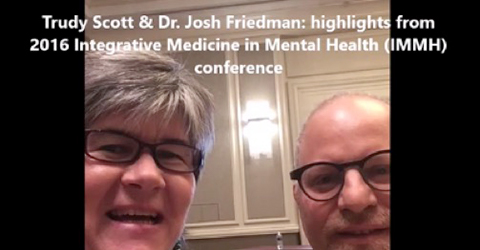
Here are some highlights from the recent Integrative Medicine for Mental Health conference. We did it live on Facebook, holding my iphone, as the conference was ending. I’m with my colleague Dr. Josh Friedman and this is the video and transcript of our discussion – we cover the following:
- Methygenetic Testing to fine tune your gene results
- Low dose lithium for irritability and alcoholism
- Kundalini yoga if you have a hard time meditating
- Coffee enemas for medication detox
- Working as a detective to find your root cause
- Simple changes like adding GABA or 5-HTP or removing gluten and/or dairy
Ok we are live… Trudy Scott, certified nutritionist and author of The Antianxiety Food Solution and Dr. Josh Friedman, a psychologist interested in integrative medicine approaches to depression.
Josh: I have a new website integrativedepressionsolutions.com and we are at the IMMH conference and it has just wrapped up – there was a huge amount of information, tons to learn, it was wonderful. What were your take aways Trudy?
Trudy: One of the things that I thought was absolutely fascinating was this booth called Methyl Genetic Testing. You can enter your 23andme data and then what you can also do is – while they are running their analysis on that – enter blood work, enter results of organic acid tests and results of stool. They actually show you if your genes are expressing and causing problems. Because you may have a MTHFR methylation genetic defect showing up on your SNP but maybe it is not causing you a problem. So this way you can actually determine if it is causing you a problem. You had shared with me that you have done the training?

Josh: The training was really amazing. Functional medicine looks at how the biochemical pathways of the body are working. This provides you with another layer – which is how are the genes that are programming those enzymes support those pathways – and it can provide you with an awful lot of information. And then they have a very simple program you plug your genes into and it gives you a guide as to what kind of supplements might help.
Trudy: Amazing! So it is really fine tuning the functional medicine and fine tuning what might actually be going on with each individual.
Josh: It gives you the next amount of information because the functional medicine actually shows you what is happening whereas the genetic testing shows you what potentiality there might be. So you might have a folic acid defect or your folate could be fine – so that was pretty interesting.
Trudy: What else did you like?
Josh: I went to a lecture on the use of low dose lithium for all kinds of things. It is something that I’ve known about – obviously pharmaceutical use [of lithium] for bipolar disorder. Low dose lithium can also be used for bipolar disorder, but the two things new I learnt is that it is incredibly helpful for irritability. So I am dealing with [clients with] depression and it is something that I have often not thought about for irritability. It is also helpful for situations if you have a parent or family history or a past history of substance abuse or alcoholism. So that was something that I’ll take home to my office.
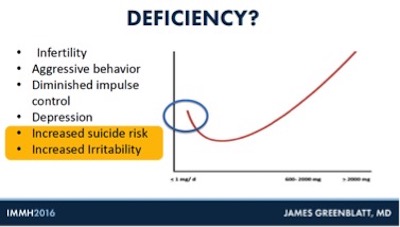
Trudy: And it is something that I currently use in my practice and [I learned it from] Dr. James Greenblatt. He actually presented on a similar topic last year and I heard it then. So low dose lithium is the lithium orotate, we want to be clear about that – 5 to 10 mg twice a day is kind of what we are thinking about. I’ve had great results with women with insomnia. It helps to stabilize the mood and when you are using the amino acids you need a stable mood – you can’t have these ups and downs – so the low dose lithium is really good for that. I would like to hear how it goes when you are using it.
Josh: I have used it with some people with a history of alcoholism and it has provided stability in their mood which is really good. What else have you got?
Trudy: I loved Dr. Kelly Brogan, we always love her, don’t we? She is just really fabulous. She talked about the issues with all the medication and how she does not prescribe anymore. And she talked about a good Paleo diet and getting off gluten and all that good stuff. New things that I heard from her was how she loves Kundalini yoga and how she loves it because she can’t meditate. I find a lot of my clients have a problem with meditating so I always say if that does not work find something that is going to work. And she has found that this Kundalini yoga works for her. So tell me a little about what you know about it?
Josh: I think Kundalini yoga is quick movements with very quick breathing so it easily occupies the mind. So for someone who would have a hard time sitting and meditating that kind of movement would be helpful. Other kinds of movements and other types of yoga are Tai Chi or qigong. Movement or walking meditation can be easier practices for stress management if sitting completely still is hard.
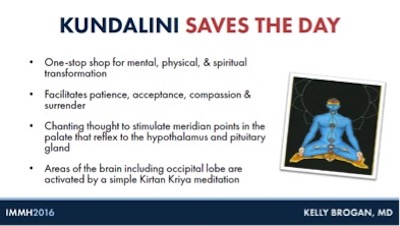
Trudy: So we are doing Facebook live here for those of you who are just joining now. We are at Integrative Medicine for Mental Health conference and it is Trudy Scott and Josh Friedman.
And I want to pass the phone to Josh to hold because my arm is sore and killing me. Maybe he will do a better job than me.
The other thing that I heard from Kelly Brogan that I really enjoyed is that she is using coffee enemas. I have quite a lot of experience with them because the first practitioner that I worked with when I was an intern used coffee enemas for detox for cancer and had really good results. Dr. Brogan was saying how effective it is for phase 1 and phase 2 detox. It also helps with bile production and the part that I really like is that it helps with medication detox. So this is something that I’m going to be looking into a little bit more and I’ll come back and share more as I learn more.
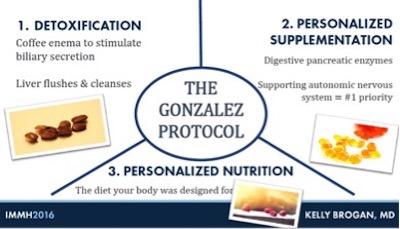
Josh: That’s pretty cool. One take away I had is that functional medicine can often be like a very complex process of delving into the root underlying cause of symptoms – so things like detox pathways or different kinds of infections. Trudy here gave a talk – and her talk was on amino acids and dietary change and blood sugar stabilization and stress management. One of the things I heard running through the entire workshop was sometimes it is simple things that can make a huge difference. And so with using amino acids for mood issues it can be incredibly quick.
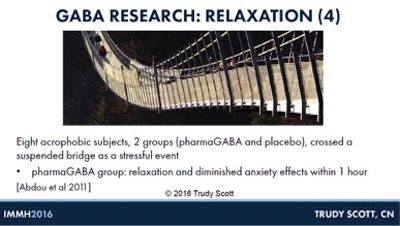
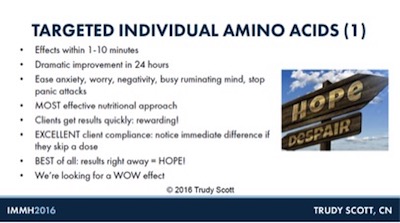
I don’t remember what her name was, but there was a psychiatrist who presented at the end, she talked about how she got into functional medicine and she was talking about the radical changes she had in her health status from simple dietary changes. So stopping gluten and dairy was a huge change for her.
Trudy: That’s important. We want to realize that these dietary changes and nutrients can have profound effects. I was talking to Dr. Nicole Beurkens earlier [about zinc and GABA for anxiety] and saying a lot of my clients will say “my anxiety and my depression is so severe I have to have medication, there is no way that diet and nutrients can make a difference”. But they really can. It can completely transform your life. I remember you shared a story of someone who got off gluten?
Josh: Yes, I see those powerful changes every day – where someone with a dietary change or a supplement like 5-HTP or GABA just changes everything. It is the one change that might move things along. It is quite amazing.
Trudy: And it is just a matter of finding what that root cause is for your anxiety and your depression – it may be low serotonin, and it may be gluten or you might need lithium support, it may be that you have an infection. We have heard about Clostridia this weekend, we’ve heard about Toxoplasma gondii, we’ve heard about Lyme disease – they can manifest in many different ways, [including anxiety and depression] – so finding that root cause is important.
Josh: So what people were talking about was being a clinical detective. So working collaboratively with your clients and just saying “it is going to be a process, we will find a solution, but it is going to take some time to figure it out.” Then there is a lot of detective work that can be done with pencil and paper: measures, asking questions, a clinical interview and it is putting the person’s story together to get to the bottom of what is going on. And so sometimes we can do that without testing. There are a lot of clinicians here, there are doctors here but neither of us are physicians and a lot of the work we both do is working with clients to try to figure out what that missing piece is.
And so, sometimes the missing piece can be quite small. I had a patient who had debilitating depression, had been hospitalized three or four times and we did one test, and the test was an IgG food allergy test. He was a weight lifter and he was doing 5 whey protein shakes a day, and it came up that he was severely allergic to dairy. He stopped dairy and within two days his mood was back to normal. I spoke to him recently and he has been stable and happy since his mood lifted.
What a wonderful outcome for his client!
And what an excellent conference! This is part 1 of our discussion. Stay tuned for part 2.
Feel free to post questions or comments below. And let us know if any of the above resonate with you?